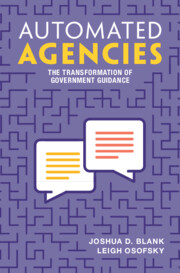Book contents
- Automated Agencies
- Automated Agencies
- Copyright page
- Dedication
- Contents
- Acknowledgments
- Introduction
- 1 The Rise of Automated Customer Service
- 2 Automated Legal Guidance
- 3 Simplexity
- 4 Simplexity in Automated Legal Guidance
- 5 View from the Inside
- 6 How Automated Legal Guidance Helps Agencies and the Public
- 7 The Hidden Costs of Automated Legal Guidance
- 8 The Democracy Deficit
- 9 How Should Automated Legal Guidance Evolve?
- 10 The Future of Agency Communications
- Conclusion
- Index
8 - The Democracy Deficit
Published online by Cambridge University Press: 03 April 2025
- Automated Agencies
- Automated Agencies
- Copyright page
- Dedication
- Contents
- Acknowledgments
- Introduction
- 1 The Rise of Automated Customer Service
- 2 Automated Legal Guidance
- 3 Simplexity
- 4 Simplexity in Automated Legal Guidance
- 5 View from the Inside
- 6 How Automated Legal Guidance Helps Agencies and the Public
- 7 The Hidden Costs of Automated Legal Guidance
- 8 The Democracy Deficit
- 9 How Should Automated Legal Guidance Evolve?
- 10 The Future of Agency Communications
- Conclusion
- Index
Summary
This chapter explores ways in which administrative law fails to address problems raised by automated legal guidance. Administrative law requires notice-and-comment procedures for so-called legislative rules, or rules that bind agencies and the public. Other, less binding agency statements regarding the law, including, for instance, statements that offer an agency’s interpretation of the law or its enforcement policy, are subject to lesser procedural requirements. This chapter examines how this blind spot in the administrative law framework mirrors a broader democracy deficit in administrative law. Strikingly, this area of law, the purpose of which is to mandate that administrative agencies act in certain ways to protect the public, simply fails to address the pervasive, and impactful, ways that agencies often communicate law to people through the types of informal explanations found in automated legal guidance. As this chapter argues, administrative law reflects a bias toward sophisticated parties, rather than the general public.
Keywords
- Type
- Chapter
- Information
- Automated AgenciesThe Transformation of Government Guidance, pp. 144 - 169Publisher: Cambridge University PressPrint publication year: 2025

